|
|
|
Sort Order |
|
|
|
Items / Page
|
|
|
|
|
|
|
| Srl | Item |
| 1 |
ID:
180025
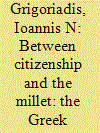

|
|
|
|
|
| Summary/Abstract |
As one of Turkey’s non-Muslim minorities, Turkey’s Greeks have faced substantial pressures since the founding of republican Turkey. As its members could not claim their constitutional rights as citizens of Turkey, emigration soared and the minority reached a point of near extinction. Significant improvements were noted when the EU-supported reform transformed the Turkish state and society from 1999 to 2010, which were not reversed as Turkey relapsed to democratic backsliding in the following years. This article explores the social dynamics and ideological frameworks that have contributed to novel perceptions of the Greek minority since after 2002, the year the Justice and Development Party (Adalet ve Kalkınma Partisi-AKP) came to power and have deterred a significant deterioration since Turkey’s democratic backsliding began. It also examines the state of Turkey’s Greeks by focusing on the state of the pious foundations, the Papa Eftim affair and the situation in the islands of Gökçeada (Imbros) and Bozcaada (Tenedos).
|
|
|
|
|
|
|
|
|
|
|
|
|
|
|
|
| 2 |
ID:
113393
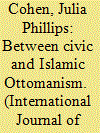

|
|
|
|
|
| Publication |
2012.
|
| Summary/Abstract |
This article explores the responses of Sephardi Jews to two moments of heightened tension and politicized violence in the Ottoman Empire during the late 19th century-the massacres of Armenians in Istanbul in 1896 and the Greco-Ottoman War of 1897. It argues that many of the strategies of representation that Jewish elites employed during these moments speak to their ability and willingness to work within a framework of Islamic Ottomanism. Recognizing this pattern complicates scholarly assumptions about the relationship of religious minorities to the deployment of state religion in general and about the responses of non-Muslims to the Hamidian regime's mobilization of Islam more specifically. Identifying the pattern is not to celebrate it, however. Sephardi Jews' relationship with Islamic Ottomanism was in many cases deeply ambivalent. Finding themselves torn between civic and Islamic forms of imperial identification during this period, Ottoman Jews soon learned that both positions could entail uncomfortable choices and disturbing consequences.
|
|
|
|
|
|
|
|
|
|
|
|
|
|
|
|
| 3 |
ID:
191075
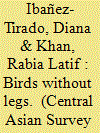

|
|
|
|
|
| Summary/Abstract |
This article examines how three generations of women in an Afghan–Turkmen family residing in Istanbul, Turkey, have experienced historical migration and legal integration. We deploy the concept of potentiality to convey these women’s experiences of legal integration as a particular form of existence that is, at times, expressed by them and other families of Afghan background with the Dari metaphor of being ‘birds without legs’. The metaphor conveys their constant mobility. Combining original ethnographic data with the analysis of historical works, we argue that families of Turkic ethnolinguistic backgrounds from Afghanistan residing in Turkey have been unable, and at times unwilling, to realize refuge, citizenship and settlement as the endpoint of their mobile trajectories.
|
|
|
|
|
|
|
|
|
|
|
|
|
|
|
|
| 4 |
ID:
108821
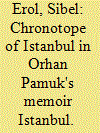

|
|
|
|
|
| Publication |
2011.
|
| Summary/Abstract |
In his memoir Istanbul, Orhan Pamuk argues that Istanbul is the site of intense hüzün (melancholy) caused by the loss of the Ottoman Empire. Furthermore, like other inhabitants of the city, that is, Istanbullus, his life is imbued with this inescapable melancholy. Taking issue with the apparent anachronism of Pamuk's historical argument, I show how he constructs and naturalizes this association between Istanbul, melancholy, and loss of empire by creating a literary genealogy for his claim. Using the Bakhtinian concept of chronotope (a schema that recognizes and explains the patterns of fusion of time, space, and emotion as thematic constellation or narrative pattern), I argue that what Pamuk identifies in and derives from the writings of his predecessors is the chronotope of Istanbul. I show how Pamuk constructs the hybrid literary canon and tradition (that references Balzac and Joyce as much as it does Beyatl? and Tanp?nar) in which he locates himself in the process of deriving this chronotope.
|
|
|
|
|
|
|
|
|
|
|
|
|
|
|
|
| 5 |
ID:
119172
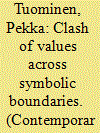

|
|
|
| 6 |
ID:
180489
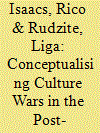

|
|
|
|
|
| Summary/Abstract |
This essay establishes a framework for analysing culture wars in the post-communist space. Using Latvia’s debate over the ratification of the Istanbul Convention on violence against women, it outlines the central features of culture wars: moralisation, externalisation of agency, the instrumentalisation of culture and the struggle for power and resources. While existing scholarship conceptualises culture wars as a dichotomous battle between the sacred and the secular, or between liberal and illiberal, our thematic analysis of the Istanbul Convention debate in Latvia finds it was less about culture and more a complex struggle between political and religious actors competing for power and resources.
|
|
|
|
|
|
|
|
|
|
|
|
|
|
|
|
| 7 |
ID:
112141
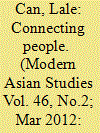

|
|
|
|
|
| Publication |
2012.
|
| Summary/Abstract |
The role of Sufi networks in facilitating trans-imperial travel and the concomitant social and political connections associated with the pilgrimage to Mecca is often mentioned in the literature on Ottoman-Central Asian relations, yet very little is known about how these networks operated or the people who patronized them. This paper focuses on the Sultantepe Özbekler Tekkesi, a Naqshbandi lodge in Istanbul that was a primary locus of Ottoman state interactions with Central Asians and a major hub of Central Asian diasporic networks. It departs from an exclusive focus on the experiences of elites, to which much of the conventional historiography on Ottoman-Central Asian relations has confined itself, and examines the butchers and bakers, craftsmen and students who set out on the hajj to Mecca in the late nineteenth and early twentieth centuries. Drawing on sources from the private archive of this lodge, the paper reconstructs the experiences of a diverse range of remarkably mobile actors and explores the myriad ways in which this Ottoman-administered institution facilitated their travel to and from Mecca. Through its focus on the conduits and mediators, the structures and buildings-the actual sites-where connections were forged, the paper sheds light on the role that such state-administered Sufi lodges played in delivering on the paternalistic rhetoric and system of sultanic charity that was an integral part of late Ottoman politics and society.
|
|
|
|
|
|
|
|
|
|
|
|
|
|
|
|
| 8 |
ID:
151292
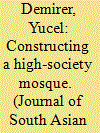

|
|
|
| 9 |
ID:
169038
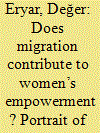

|
|
|
|
|
| Summary/Abstract |
This article empirically investigates the impact of internal migration on women’s empowerment in urban areas of Turkey. Based on data from a nationally representative household survey, we find that migration exerts a positive impact in urban settings through improvements in educational attainment and labor market outcomes. Migration contributes to women’s empowerment by raising their education levels and lowering the gap in schooling between men and women. Migration also allows migrants, both men and women and particularly those with tertiary education, to access jobs and occupations in high wage regions like Istanbul. However, unlike in education, a gender wage gap persists even after migration.
|
|
|
|
|
|
|
|
|
|
|
|
|
|
|
|
| 10 |
ID:
123199
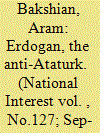

|
|
|
|
|
| Publication |
2013.
|
| Summary/Abstract |
THIS NOVEMBER 10, at precisely 9:05 a.m., for the seventy-fifth time in the history of the Turkish Republic, the nation will grind to a halt. In Istanbul, for sixty seconds sirens will drone, ferryboat horns will blare in the Golden Horn and traffic will freeze. Throughout the country, millions of ordinary Turks will stand still and mute to mark the death anniversary of their nation's founding father. It is an impressive moment, and deservedly so. Mustafa Kemal, known to history as Kemal Ataturk ("Father of the Turks"), was an indomitable blend of soldier, diplomat, politician, intellectual and nation builder. One of the twentieth century's most remarkable leaders, he was a man of iron will and incredible vision.
|
|
|
|
|
|
|
|
|
|
|
|
|
|
|
|
| 11 |
ID:
108396
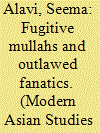

|
|
|
|
|
| Publication |
2011.
|
| Summary/Abstract |
This paper follows the careers of 'outlawed' Indian Muslim subjects who moved outside the geographical and political space of British India and located themselves at the intersection of nineteenth century trans-Asiatic politics: Hijaz, Istanbul and the Arab provinces of the Ottoman Empire, and Burma and Acheh in the East. These areas were sites where 'modern' Empires (British, Dutch, Ottoman and Russian) coalesced to lay out a trans-Asiatic imperial assemblage. The paper shows how Muslim 'outlaws' made careers and carved out their transnational networks by moving across the imperial assemblages of the nineteenth century. British colonial rule, being an important spoke in the imperial wheel, enabled much of this transnationalism to weld together. Webs of connections derived from older forms of Islamic connectivity as well: diplomacy, kinship ties, the writing of commentaries on Islam and its sacred texts in unique ways, oral traditions, madrasa and student contacts. These networks were inclusive and impacted by the tanzimat-inspired scriptural reformist thought in the Arab provinces of the Ottoman Empire. They were not narrowly anti-colonial in tone as they derived from a complex inter-play of imperial rivalries in the region. Rather, they were geared towards the triumph of reformist Islam that would unite the umma (community) and engage with the European world order. The paper shows how this imperially-embedded and individual-driven Muslim transnational network linked with Muslim politics rooted within India.
|
|
|
|
|
|
|
|
|
|
|
|
|
|
|
|
| 12 |
ID:
106292
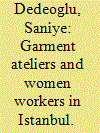

|
|
|
|
|
| Publication |
2011.
|
| Summary/Abstract |
Not only multinational corporations but also small-scale firms are recognized as part and parcel of global commodity production. Most of this production is destined for western economies but not all commodities of industrial production end up in these countries. There is a high volume of trade taking place between developing regions. This article aims to highlight industrial production for the shuttle trade in the Laleli market of Istanbul and the central role that women's and immigrants' labour plays in this production. Garment ateliers producing for the Laleli market are usually operated as family establishments in which tapping into cheap female and immigrant labour through kin networks has been a main form of survival for the ateliers and has generated a successful internationally trading industry.
|
|
|
|
|
|
|
|
|
|
|
|
|
|
|
|
| 13 |
ID:
137949


|
|
|
|
|
| Summary/Abstract |
As the Great War entered 1915, the stalemate continued unabated on the Western Front. In an attempt to force the Central Powers’ hand, Winston Churchill – then First Lord of the Admiralty – developed plans to drive the Ottomans out of the war and, potentially, to bring Greece and Bulgaria in on the side of the Allies. He proposed a naval attack on the Dardanelles, which would expose Istanbul and open up a supply route with Russia.
|
|
|
|
|
|
|
|
|
|
|
|
|
|
|
|
| 14 |
ID:
097542
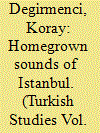

|
|
|
| 15 |
ID:
091002
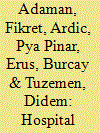

|
|
|
|
|
| Publication |
2009.
|
| Summary/Abstract |
This study analyzes patient characteristics that affect the choice between public and private healthcare providers in Istanbul. In addition to socioeconomic variables often considered, this study focuses on another factor that might determine the ease of access to hospital services in developing countries: the availability of social networks. The analysis is based on data from a household survey conducted in Istanbul. The econometric results provide some evidence that potential social ties play an important role in choosing public healthcare centers over private ones for minor health problems. This finding indicates that households with higher-level social networks might be using them in easing access to public facilities.
|
|
|
|
|
|
|
|
|
|
|
|
|
|
|
|
| 16 |
ID:
186579
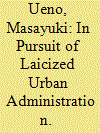

|
|
|
|
|
| Summary/Abstract |
The Ottoman Empire introduced the muhtar system in Istanbul in 1829, appointing lay headmen, called muhtar, to the lowest levels of urban administration: Muslim neighborhoods; Orthodox, Armenian, and Catholic parishes; and Jewish congregations. This reform resulted in the overlapping of state responsibilities and those of non-Muslim religious authorities, later leading to disputes between the groups. This article investigates such disagreements in an effort to understand how state officials perceived non-Muslim religious authorities’ participation in imperial governance. In so doing, this article argues that, as non-Muslim political movements began developing during the late nineteenth century, state officials adopted a cautious attitude toward non-Muslim clergy, viewing the latter as requiring more careful handling than the layman. This take on clergymen was a shift, a reconsideration of the exceptional treatment they had previously enjoyed, and ignited a growing desire to sever the ties, formerly tolerated, between muhtars and religious authorities.
|
|
|
|
|
|
|
|
|
|
|
|
|
|
|
|
| 17 |
ID:
133299
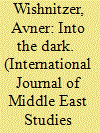

|
|
|
|
|
| Publication |
2014.
|
| Summary/Abstract |
This article analyzes different traditions of nocturnal conviviality in 18th-century Istanbul and demonstrates their importance for social, political, and cultural life. The main argument is that the palace used the night to demonstrate its power in spectacles of light and to cultivate personal relations within the elite, both of which were crucial for a patrimonial government based on face-to-face interaction. Yet, it was exactly the reliance on such interaction that marked the limits of the palace's hold of the night. With the neighborhood gaze blinded by darkness, communal policing lost much of its effectiveness, leaving nocturnal social life largely concealed from the eyes of the authorities. Nighttime therefore offered opportunities for illicit modes of socialization and, at times, for subversive political action.
|
|
|
|
|
|
|
|
|
|
|
|
|
|
|
|
| 18 |
ID:
084071
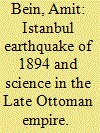

|
|
|
|
|
| Publication |
2008.
|
| Summary/Abstract |
A devastating earthquake hit Istanbul and its environs shortly after noon on 10 July 1894. Although seismic disturbances were quite frequent in the long history of the Ottoman capital, the imperial city had not witnessed such violent tremors in more than a century. Hundreds of people died and thousands more were injured as a result of the complete or partial collapse of private dwellings, mosques, churches, synagogues and other public buildings. The earthquake of July 1894 hit the seat of the Ottoman government during a period of rapid socio-cultural change and shortly before the empire faced one of its worst crises in the late nineteenth century. As may be expected, many people in the Ottoman lands sought an explanation to the calamity that befell the inhabitants of the capital and neighbouring regions. Some could draw on long-standing interpretive traditions that were primarily either theological in nature or based on classical naturalist theories. However, the Ottoman intelligentsia rejected such explanations out of hand. The Ottoman response to the earthquake mirrored the similar embrace of science's authority and adoption of scientific methods and tools in many other contemporary societies. The process of the expansion and globalization of scientific knowledge expanded beyond the boundaries of Europe and its colonies. Science and technology were widely perceived to be the measure of civilization and modernity. The Ottoman intelligentsia and political elite were therefore invested in helping the Ottoman Empire meet standards that were set in Europe and North America but also achieved quite successfully in Japan. They seized upon the earthquake of 1894 to disseminate knowledge of modern earth sciences and implement new methods of scientific study of seismic events in the Ottoman lands.
|
|
|
|
|
|
|
|
|
|
|
|
|
|
|
|
| 19 |
ID:
195229


|
|
|
|
|
| Summary/Abstract |
This study explores cohesion levels within Istanbul's internal migrant groups, focusing on formal solidarity networks and Hometown Associations (HTAs). It examines disparities in organizational density within formal associations among these groups and identifies the underlying factors that contribute to the varying degrees of cohesion. The findings highlight a contiguous region at the intersection of the Black Sea's hinterland and Eastern Anatolia, where migrants in Istanbul exhibit higher levels of solidarity through organizational density. HTAs originating from villages tend to concentrate in peripheral settlements, while city and district associations are prevalent in central residential areas. This research adds to the understanding of internal migration and solidarity networks, offering a data-driven basis for further studies. It presents an innovative metric for quantifying the bonds within migrant groups, crucial for evaluating their social capital. This metric serves as a foundation, encouraging a broader research agenda to deepen insights into migrant social capital.
|
|
|
|
|
|
|
|
|
|
|
|
|
|
|
|
| 20 |
ID:
151624
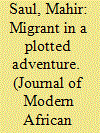

|
|
|
|
|
| Summary/Abstract |
This article presents the cases of two migrant men, a Senegalese and a Nigerian, who spent many years in Istanbul. Although their backgrounds, personalities and circumstances were different, they both did export-related commercial work in the city. After describing sub-Saharan migration to Turkey and the literature concerning it, the text focuses on the stories these migrants spontaneously presented as they explained why they had become migrants. It was striking that with very different personal details, events and coincidences, both stories attribute the decision to migrate to Istanbul to a traumatic accident that forced the protagonists to change a life that until that point did not involve transnational migration. In the stories the protagonist's ambition, determination and will are rendered invisible and he is presented as a victim. I call this rhetorical topos ‘great mishap’. It resonates with stories I have heard from other migrants. I interpret it as an expression of compunction, of social responsibility weighing on the actor for abandoning close others in favour of an individual quest for self-realisation.
|
|
|
|
|
|
|
|
|
|
|
|
|
|
|
|
|
|
|
|
|